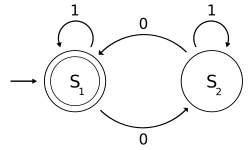Logic in computer science covers the overlap between the field of logic and that of computer science. The topic can essentially be divided into three main...
17 KB (1,837 words) - 22:22, 16 June 2025
on Logic in Computer Science (LICS) is an annual academic conference on the theory and practice of computer science in relation to mathematical logic. Extended...
6 KB (670 words) - 09:18, 2 July 2025
from fields such as logic, set theory, model theory, category theory, etc. It has close links with other areas of computer science such as programming...
18 KB (1,671 words) - 03:37, 10 May 2025
Boolean algebra (redirect from Boolean logic in computer science)
In mathematics and mathematical logic, Boolean algebra is a branch of algebra. It differs from elementary algebra in two ways. First, the values of the...
75 KB (9,571 words) - 10:59, 18 July 2025
In logic and computer science, specifically automated reasoning, unification is an algorithmic process of solving equations between symbolic expressions...
70 KB (7,377 words) - 06:19, 23 May 2025
proof) lies behind the applications of linear logic in computer science, since it allows the logic to be used in proof search and as a resource-aware lambda-calculus...
34 KB (2,979 words) - 10:22, 20 May 2025
multiple types (e.g., additive vs. multiplicative). Used in: Computer science, concurrency, quantum logic. Constructive set theory (e.g., CZF — Constructive...
7 KB (615 words) - 01:05, 16 June 2025
temporal logic (PTL). In terms of expressive power, LTL is a fragment of first-order logic. LTL was first proposed for the formal verification of computer programs...
18 KB (1,832 words) - 09:51, 23 March 2025
multiple inheritance". Proceedings. Fourth Annual Symposium on Logic in Computer Science. pp. 92–97. doi:10.1109/LICS.1989.39162. Lämmel, Ralf; Visser...
17 KB (1,862 words) - 06:35, 16 March 2025
also notable for its connections to theoretical computer science. In broad terms, categorical logic represents both syntax and semantics by a category...
11 KB (1,104 words) - 20:39, 15 June 2025
Fuzzy logic is a form of many-valued logic in which the truth value of variables may be any real number between 0 and 1. It is employed to handle the...
55 KB (6,597 words) - 10:19, 20 July 2025
Theoretical computer science is a subfield of computer science and mathematics that focuses on the abstract and mathematical foundations of computation...
42 KB (4,803 words) - 23:57, 1 June 2025
Constructive S4 Modal Logic (PDF). Proceedings of the 15th International Workshop on Computer Science Logic. Lecture Notes in Computer Science. doi:10.1007/3-540-44802-0_21...
53 KB (8,022 words) - 17:26, 12 July 2025
This list of computer science awards is an index to articles on notable awards related to computer science. It includes lists of awards by the Association...
34 KB (859 words) - 19:06, 28 July 2025
Christopher P. (1979). Edinburgh LCF: A Mechanised Logic of Computation. Lecture Notes in Computer Science. Vol. 78. Berlin Heidelberg: Springer. doi:10.1007/3-540-09724-4...
5 KB (614 words) - 18:48, 19 March 2025
combinatory logic. The upshot of these historical contingencies was that until theoretical computer science began taking an interest in combinatory logic in the...
42 KB (5,301 words) - 11:48, 17 July 2025
"Local Action and Abstract Separation Logic" (PDF). 22nd Annual IEEE Symposium on Logic in Computer Science (LICS 2007). pp. 366–378. CiteSeerX 10.1...
21 KB (2,832 words) - 21:28, 27 July 2025
In computer science, separation logic is an extension of Hoare logic, a way of reasoning about programs. It was developed by John C. Reynolds, Peter O'Hearn...
28 KB (3,641 words) - 03:05, 28 July 2025
In other words, sequential logic has memory while combinational logic does not. Combinational logic is used in computer circuits to perform Boolean algebra...
6 KB (710 words) - 03:36, 7 June 2025
Model checking (redirect from Temporal logic in finite-state verification)
In computer science, model checking or property checking is a method for checking whether a finite-state model of a system meets a given specification...
25 KB (2,788 words) - 21:41, 19 June 2025
Horn clause (redirect from Horn logic)
Correct Program Development in Computational Logic". Program Development in Computational Logic. Lecture Notes in Computer Science. Vol. 3049. pp. 1–29. doi:10...
11 KB (1,283 words) - 17:29, 30 April 2025
In computer science, algebraic semantics is a formal approach to programming language theory that uses algebraic methods for defining, specifying, and...
11 KB (1,666 words) - 19:48, 19 June 2025
using branching time temporal logic" (PDF). Logic of Programs, Proceedings of Workshop, Lecture Notes in Computer Science. Vol. 131. Springer, Berlin....
18 KB (2,913 words) - 04:16, 23 December 2024
mathematical logic bears to mathematics and as philosophical logic bears to philosophy. It is an alternative term for "logic in computer science". Computational...
3 KB (375 words) - 04:16, 7 April 2024
electronics, digital logic and design, software engineering, database systems and core subjects of theoretical computer science such as theory of computation...
4 KB (317 words) - 23:35, 27 July 2025
Used in digital computer systems. Graph theory – Foundations for data structures and searching algorithms. Mathematical logic – Boolean logic and other...
11 KB (1,036 words) - 19:01, 2 June 2025
Game semantics (redirect from Dialogic logic)
on Logic In Computer Science: 17-26. ISBN 978-0-7695-3746-7. G. Japaridze, Introduction to computability logic. Annals of Pure and Applied Logic 123...
23 KB (2,857 words) - 20:45, 26 May 2025
In logic, philosophy, and theoretical computer science, dynamic logic is an extension of modal logic capable of encoding properties of computer programs...
29 KB (5,118 words) - 06:24, 18 February 2025
systems, logic in computer science, and computational complexity. Kolaitis obtained a bachelor's degree in mathematics from the University of Athens in 1973...
7 KB (630 words) - 20:59, 26 May 2025
theoretical computer scientist based at the University of Essex. He is best known for his work on logic in computer science and for his pioneering work in the...
4 KB (338 words) - 21:27, 27 March 2025






